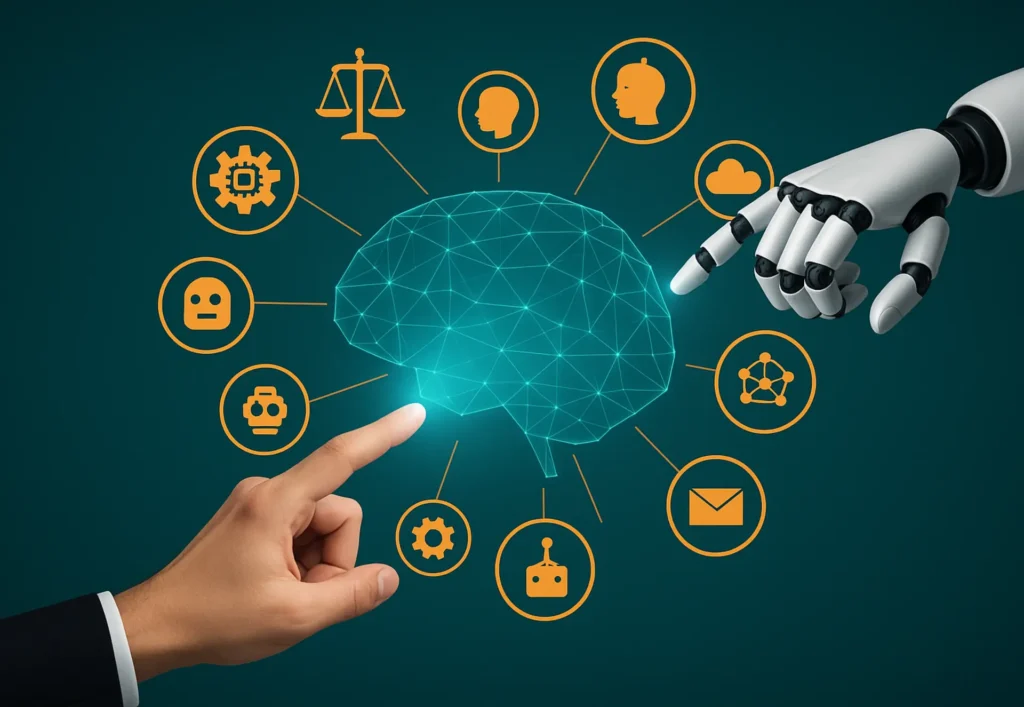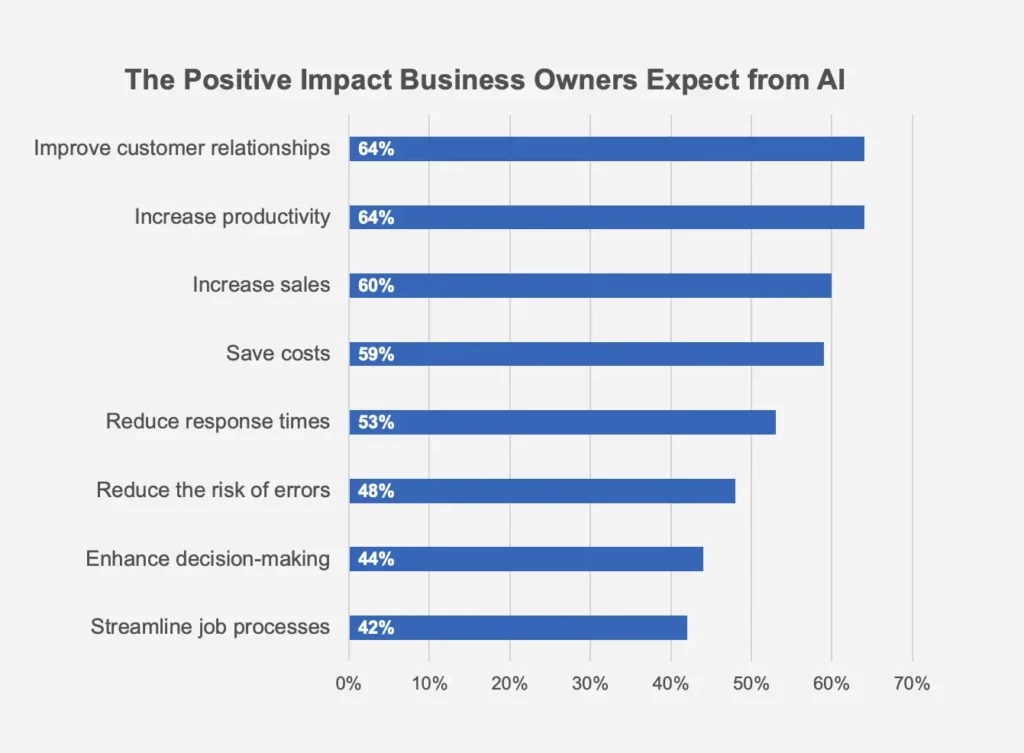
AI Won’t Replace Humans, but Humans Using AI Will
October 16, 2023
In today’s digital age, there’s an ongoing debate about whether AI will replace humans. Yet, a growing consensus offers a different narrative: AI won’t replace us, but instead, humans using AI will outperform those without it.
Technologies Enhance Human Potential
AI can handle repetitive, data-driven tasks, liberating humans to focus on more creative, strategic endeavors. This symbiotic relationship unleashes human potential.
This concept, rooted in the historical progression of technology, is easy to grasp. Since the time of the Industrial Revolution, human technology has consistently advanced. With each step, we’ve developed automated devices that allow us to offload mundane, repetitive, and uninspiring tasks to machines, freeing us up to focus on more meaningful endeavors.
Consider the Automated Teller Machine (ATM) as an example. Prior to 1967, people had to physically visit a bank to withdraw money. Missing the bank’s operating hours meant you couldn’t access your funds. John Shepherd-Barron, facing this very inconvenience, gave birth to the ATM. However, the ATM didn’t entirely replace the role of bank tellers. Instead, it took over tasks like withdrawals and deposits, allowing bank staff to offer customers more advanced financial services with flexibility.

Likewise, the invention of computers and the Internet has significantly driven down the cost of communication. When we look back over the past 30 years, it’s truly remarkable to see how, in 2023, a mere smartphone is all you need to produce short films, shoot advertisements, upload videos, and even record podcasts to establish your own media businesses.
AI Has Become an Integral Part of Our Daily Routine
AI is no exception to this trend. Since the 21st century began, it has become an integral part of our daily lives, saving us considerable time in both work and personal tasks. For instance, AI algorithms enable auto-generated subject lines and content in Google Gmail, recommendations on Netflix and YouTube, precise ads on Instagram, and music suggestions on Spotify.
Moreover, numerous online tools, such as image editors, productivity apps, and programming software, come with AI features for editing, optimizing, and content generation. To some degree, society, especially Digital Natives from Generation Z, has become accustomed to this.
Compared to previous generations, Generation Z has already become proficient in AI tools like ChatGPT. They rely on this chatbot for a range of tasks, including creating cover letters, polishing essays, refining ideas, examining code, and managing finances. Interestingly, some universities have adopted generative AI as a valuable addition to their curricula, rather than avoiding it due to concerns about academic integrity.1
Let’s take AJ Eckstein, a 24-year-old consultant at a Fortune 500 company, as an example. He incorporates new AI tools into his daily routine.2
When emailing colleagues, he instructs chatbots to draft initial versions and fine-tune them to achieve a professional yet approachable tone. He also uses ChatGPT and other chatbots for tasks such as competitive analysis, business case analysis, and exploring emerging markets.2
The real benefit of AI for professionals like Eckstein is not just time-saving but enabling them to focus on tasks they enjoy and building stronger client relationships. By using AI, he spends less time on mundane tasks and more time on strategic work. Other Generation Z professionals echo this sentiment, emphasizing that AI allows them to concentrate on high-value tasks.2

(Photo by Burst on Unsplash)
The Collaborative Future with AI
AI enables efficiency, data analysis, and automation, but human creativity, empathy, and decision-making remain irreplaceable. By leveraging AI as a tool, businesses and individuals can automate repetitive tasks, access and analyze vast amounts of data, and gain insights to make more informed decisions.
The future is not about AI replacing humans but collaborating with them. Businesses and individuals that invest in human-AI partnerships gain a competitive edge.
Forward-thinking organizations are actively integrating human expertise and AI to boost productivity and foster innovation.
Related Article: “It’s so good” Bakery Adopts Vision AI for Workforce Streamlining
In a survey conducted by Forbes Advisor, the majority of business owners in the US who either use AI or plan to start using it within the next six months think that AI will have a positive impact on their businesses. Specifically, 64% of them believe AI will enhance customer relationships and boost productivity, while 60% expect it to increase sales. Additionally, 59% are hopeful that AI will lead to cost savings, and 42% think it will make their work processes more efficient.3

Harvard Business School professor Karim Lakhani suggested that companies should encourage all employees to think digitally. He recommended creating an environment where everyone is free to experiment, setting up spaces for innovative ideas, offering internal training programs for everyone, not just tech professionals alone. 4
Companies are also advised to provide access to various tools and actively incorporate employees’ fresh ideas into evaluations, helping them improve work efficiency and achieve work objectives. 4 When humans harness AI’s potential, the possibilities are limitless. This collaborative future offers the best of both worlds. As Karim Lakhani stated, “AI is not going to replace humans, but humans with AI are going to replace humans without AI.” 4
(The featured image was generated using ChatGPT’s AI tools for illustrative purposes only.)
[References]
1 Abril, Danielle. “New Gen Z graduates are fluent in AI and ready to join the workforce.” The Washington Post, 28 June 2023, https://www.washingtonpost.com/technology/2023/06/28/ai-gen-z-work/.
2 York, Alexandra, and Jacob Zinkula. “AI could supercharge the Gen Z takeover.” INSIDER, 1 July 2023, https://www.businessinsider.com/how-ai-can-help-gen-z-succeed-workplace-2023-7.
3 Haan, Kathy. “How Businesses Are Using Artificial Intelligence In 2023.” Forbes Advisor, 24 April 2023, https://www.forbes.com/advisor/business/software/ai-in-business/.
4 “AI Won’t Replace Humans — But Humans With AI Will Replace Humans Without AI.” Harvard Business Review, 4 August, 2023, https://hbr.org/2023/08/ai-wont-replace-humans-but-humans-with-ai-will-replace-humans-without-ai.

